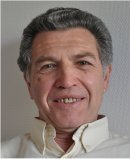|
Plenary Lecture
Hand Reaching Adaptive and Online
Motor Control Processes

Dr. Claude Prablanc
Directeur de Recherche at Unit 864 Espace et Action
(INSERM-Bron)
France
E-mail:
prablanc@free.fr
Abstract:
Several sensori-motor processes are devoted to error
reduction for the production of purposeful actions. When
motor responses deviate from their goal, online
corrections can be performed either under voluntary
control with time consuming additional sub-movements or
under fast automatic smooth control. When errors cannot
be corrected online and are repeated over trials,
subsequent responses can be improved iteratively through
adaptation, a progressive adjustment of motor commands
that acts to reduce the magnitude of error. The sources
of these errors may result from an erroneous evaluation
of the goal, from unexpected perturbations of the goal
itself , or from a patient’s inability to both plan and
correct a movement after prefrontal, frontal, parietal,
cerebellar or vestibular lesions from vascular or
neurodegenerative origin.
Although long term natural sensorimotor recovery is not
necessarily the same process as short term adaptation
that can be studied experimentally, more knowledge about
the latter helps improving the former, illustrated by
the attentional and perceptual rehabilitation obtained
through sensorimotor prism exposure in neglect patients.
As prism adaptation is rather complex, involving many
sensorimotor loops along the eye head hand system
connecting reciprocally the perception-action cycle, it
is necessary to disentangle some of the major error
signals acting upon adaptation.
It has been argued that reaching adaptation results
essentially from a conflict between actual sensory
feedback and expected sensory feedback. In order to show
that such a mechanism is unlikely to be responsible for
most of the adaptive process, we have developed two
reaching paradigms that provide the subject with
undistorted hand visual feedback. Both paradigms induce
motor planning errors unknown to the subjects and allow
an efficiency assessment of the many feedback loops
through real time a control of the oculomotor and upper
limb sensorimotor loops.
The first one yields continuous retinal and visuomotor
feedback, allowing fast and complete automatic online
corrections. It suggests that the same online corrective
processes are carried out under natural conditions
without awareness. In addition despite a reiterated
motor planning error and an automatic online correction
of the whole error, this paradigm shows a complete lack
of adaptation.
The second paradigm allows an investigation of the role
of terminal error feedback only, where all visual
feedback is eliminated during movement execution.. In
contrast to the first paradigm, it exhibits a robust and
generalised adaptation, although devoid of limb
inter-sensory mismatch. These results demonstrate
independence between the induced motor adaptation and
the automatic online correction, both characterized by
the lack of any cognitive interference. A putative
visuomotor cerebro-cerebellar network accounting for
these results is proposed.
Brief Biography of the Speaker:
Claude Prablanc graduated from the Ecole Superieure de
Marseille (Electrical Engineering) in 1966, and from the
Ecole Nationale Superieure d’Electricite, d’Electronique,
d’Informatique et d’Hydraulique de Toulouse in 1967.
After a few years working as an engineer for the
automated subway Network, he followed a training in
neuropsychology and got a researcher position at the
Institut National de la Sante et de la Recherche
Medicale (INSERM) in 1973. He spent one year in 1981 at
the Psychology Department in MIT, working on monkey
motor control. His current position is Directeur de
Recherche at Unit 864 Espace et Action (INSERM-Bron).
His main research interests in Neuroscience are Motor
Psychophysics of the eye-head-hand sensorimotor system
and of its plasticity, in both normal subjects and
neurological patients.
|